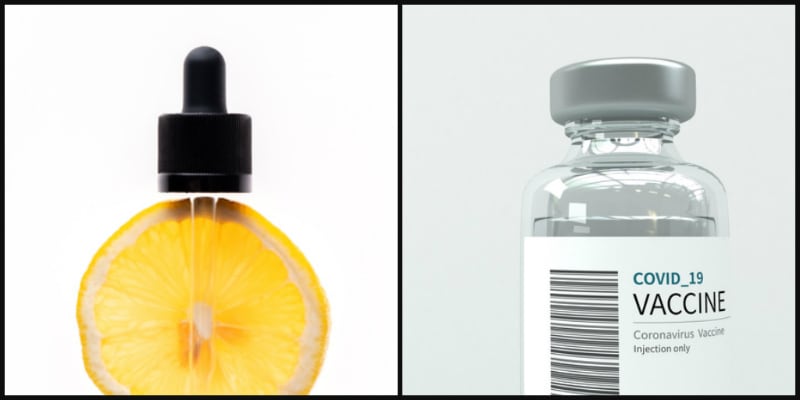Since vaccinations began in December, the federal government has delivered nearly 143 million vaccine doses to states and territories, and more than 77% have been administered, according to the latest figures from the US Centers for Disease Control and Prevention. Currently, the country is averaging about 2.4 million shots a day.
Is the vaccine a threat to the category?
“While COVID-19 vaccines universally rolling out to Americans might seem like a net-negative event to the industry, I believe consumers will sustain their elevated supplement usage,” said Joshua Schall, retail market guru and principal of J. Schall Consulting.
“As more people vaccinate, they will also potentially be taking fewer precautions, such as regularly wearing a mask and social distancing. In a way, one can say that immune support will be the new mask and glove that allow friends and family to get closer again,” said Morris Zelkha, CEO of TriNutra.
Indeed, all the stakeholders and brands we spoke with said sales continue to be strong.
Courtney Nichols-Gould, co-CEO SmartyPants, said so far the vaccine rollout has not impacted sales from what she can tell.
“As a high retention brand, we really don’t anticipate that it will [impact sales]. We are still seeing increases in the category, and believe this to be an exacerbation of existing trends — shifts that were already happening, just happening slightly sooner than they would have otherwise. A shift toward preventative health solutions. A shift toward ecommerce. And a shift toward investing in ‘better for you’ brands that care about the impact they have on their consumers health as well as the planet,” said Gould.
Zelkha said that while he predicts the spike in immune support will eventually taper off, he expects interest and sales will continue to stay high in the category for a long time.
“A vaccine rolling out will definitely affect the purchasing decisions of some people, but many others have developed improved health habits that include regular supplementation with ingredients that support immune health. Furthermore, consumers have become more educated about the breadth of options available beyond multivitamins and minerals and, according to a recent Nutrition Business Journal survey, have begun to turn more to complex immune-boosting formulas and herb and botanical blends to support their efforts," he said.
"If resistant strains spread widely, consumers that received early or initial vaccines will again be at a higher risk and seeking ways to support their immune system. Even without worries of mutations, many consumers’ desire to be in better control of their health won’t stop at a vaccine, and interest in immune health supplements will continue on and I expect there to be continual sales growth over the next few years too,” Zelkha said.
Plexus and Nouri also said their immune support products remain unaffected by the vaccine rollout.
“Sales are robust, sales are great. And I think it's going to stay that way,” said Loren Israelsen, founder and president of the United Natural Products Alliance (UNPA). “I don't think the vaccine is going to affect people's usage patterns or interest or desire to use supplements. In fact, I think it probably enhances it. For this reason, the message we're going to begin to hear from our political leaders and our health professionals is that our goal is to get through the pandemic phase and this is going to become an endemic condition.”
From seasons to year round
“Although focus is centered on COVID-19, we should not forget that it is not the only virus on the playground. The vaccine will help the fight against COVID-19, but also will likely reduce the practice of hygiene, masks and personal distancing that have protected people from other pathogens too. Boosting the immune system is important for comprehensive protection from a variety of health challenges, keeping the category relevant for years to come,” said Zelkha.
He added that more than ever before, consumers are incorporating immune support as part of a healthy lifestyle in tandem with improved nutrition, exercise and stress management. “This means that we will also see a larger push towards year-round immune support efforts rather than the seasonal interventions that have been typical in past years.”
Supplements reign supreme
Global immunity boosting products market is expected to witness growth over the next five years and surpass $ 17 billion by 2025, according to ReportLinker. Supplements have captured the major share in the market due to the availability of instant powder/liquid mixes in retail stores along with rising sales of tablets and capsules. Supplements are expected to maintain dominance over food and beverage formats during the projected period as well.
“Traditional forms of supplements with herbal ingredients like elderberry, echinacea, astragalus, turmeric, and ginger will remain attractive for consumers, but the biggest layup here is in the food and beverage space. If these companies have applicable products in-market already, I’d fully expect them to bring more attention to the roles that these specific ingredients play in improving overall health and well-being. If they are without applicable products in-market already, I’d expect new line extensions from at least the leading ‘better for you’ food and beverage brands,” said Schall.
“We know that immunity is top of mind for consumers based on the flavors they are gravitating towards. Elderberry, ginger, lemon and other antioxidant-filled flavors have all seen increases in new product development,” said Becca Henrickson, marketing manager at flavor firm Wixon. “In product launches as well, we’ve seen a marked increase in food and beverage products with immunity functional claims – up 22% from 2016 to 2020, according to Mintel GNPD.”
Henrickson added that immune health is affected by more than just what we eat and drink. “Sleep and stress levels can also have an impact on our immunity and general health. My recommendation for brands is to identify ways to provide maximum impact for consumers by pairing immunity claims with complementary functional benefits and promoting good nutrition.”
According to Zelkha, people are supplementing with immune support and getting back to more of a normal social life, resulting in more innovation and new development for old and new ingredients to meet the demand.
Opportunity
Israelsen said the situation presents huge opportunities for education. “We all talked a lot about immunity when it comes down to explaining what that really means. Not too many of us can do that effectively because there's different kinds. The bummer is that companies themselves are really limited and what they can say about immunity and COVID-19. You will see the dark shadow of regulators over your shoulder very quickly if you do [discuss immunity and COVID].”
“The missed opportunity, if there is one, is to do much more education to try and help people be better informed to make better choices over time,” Israelsen continued. “If you're a parent, what do you do for your kids? How can you help your elderly parents? What can we do for people who have existing autoimmune conditions?”
According to the Innova Consumer Survey 2020, 54% of global consumers claimed to have spent time educating themselves on ingredients and procedures that could boost their immune health in the wake of concerns over COVID-19. When asked which elements would be most important to achieve, immune health, choosing foods naturally high in nutrients ranked in the top three. Interest in botanical ingredients also showed an increase.
Schall said be on the lookout for thought leaders and brands with authority to start talking about immune rejuvenation or the ability to train for immunity.
“This discussion will include a lot of the typical healthy living recommendations that have stood the test of time, but I expect it to be stickier now because of higher fear levels still permeating from last year. Additionally, the abundance of at-home testing and wearable adoption will be leveraged to monitor variables that can help track variables that can improve your immune health,” forecasted Schall.
With 1 in 5 Americans tracking their health via a wearable device or health app, digital health technology certainly presents an exciting opportunity for personalized and precision nutrition.
Messaging
Another common theme that emerged during discussions among stakeholders and brands is the importance of messaging, particular from media.
Zelkha said pandemic or not, immune health has long been a leading category because it relates to everyone. He added that especially in the next year or so, media will continue to play a role in how much attention the category attracts.
Schall likened media to the unsung heroes of the category. “A major underappreciated change agent for supporting a healthy immune system was actually the mainstream media. Though seeing negative COVID-19 stats 24/7 was heart-wrenching, many consumers eventually realized they needed to take action by prioritizing preventive care routines,” explained Schaul.
Looking ahead
Like consumers, industry has a lot of questions too.
Michael Hartman, PhD, vice president of research and development at Plexus Worldwide, wonders if vaccines will lead to more travel and prompt a secondary demand for immune health products.
“If we're taking the same things all the time, do we need to take rest breaks to allow our system to essentially reboot and vary our routines?” wonders Israelsen.
“Since we have been cooped up for so long and the cold and flu rate has plummeted, does that mean our immune systems are out of shape and will be slow to respond to pathogens?” asked Zelkha.
While there may be more questions than answers at this point, one thing is clear — health crises and vaccines may come and go, but the immune category is here to stay.
If Ben Franklin were alive, there’s a good chance he’d say “There are three things certain in life: death, taxes and immune support.”


